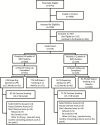Efficacy of a tobacco quitline among adult survivors of childhood cancer
- PMID: 25335944
- PMCID: PMC4838048
- DOI: 10.1093/ntr/ntu216
Efficacy of a tobacco quitline among adult survivors of childhood cancer
Abstract
Introduction: The purpose of this investigation was to determine the efficacy of two evidence-based tobacco quitlines in adult survivors of childhood cancer who regularly smoke cigarettes.
Methods: A total of 519 adult survivors of childhood cancer were randomized to either Proactive + 4 weeks of medication (Counselor-initiated intervention, n = 260) or a Reactive + 2 weeks of medication (Participant-initiated intervention, n = 259) condition. Both conditions received telephone counseling to quit smoking as well as nicotine replacement therapy. The primary outcome was biochemically verified (i.e. cotinine) point prevalence smoking cessation at 12 months follow-up.
Results: Participants randomized to the Proactive + 4 weeks of medication condition self-reported a higher rate of cessation than those survivors in the Reactive + 2 weeks of medication condition at 8 weeks (33.2% vs. 17.0%, p < .001), but cessation rates were not significantly different at 12 months (23.0% vs. 18.7%, p = .29). However, 80% of participants claiming abstinence failed biochemical verification, indicating marked falsification of self-reported smoking status. Adjusted cessation rates were less than 2% in both intervention conditions.
Conclusions: Our results indicate that neither a Proactive + 4 weeks of medication or Reactive + 2 weeks of medication quitline significantly impacted long-term smoking cessation rates. Our results further indicate that self-reports of smoking status are unreliable in survivors of childhood cancer, a population in considerable need of tobacco abstinence. Rates of smoking cessation may be markedly overestimated in studies of childhood cancer survivors that rely on self-reports of tobacco abstinence, and future studies need to include biochemical verification of tobacco status in this population.
© The Author 2014. Published by Oxford University Press on behalf of the Society for Research on Nicotine and Tobacco. All rights reserved. For permissions, please e-mail: journals.permissions@oup.com.
References
-
- National Cancer Policy Board. Childhood Cancer Survivorship: Improving Care and Quality of Life. Washington (DC): National Academies Press; 2003. - PubMed
-
- Emmons K, Li FP, Whitton J, et al. Predictors of smoking initiation and cessation among childhood cancer survivors: a report from the childhood cancer survivor study. J Clin Oncol. 2002;20:1608–1616. - PubMed
-
- Frobisher C, Winter DL, Lancashire ER, et al. Extent of smoking and age at initiation of smoking among adult survivors of childhood cancer in Britain. J Natl Cancer Inst. 2008;100:1068–1081. - PubMed
Publication types
MeSH terms
Substances
Grants and funding
LinkOut - more resources
Full Text Sources
Other Literature Sources
Medical


